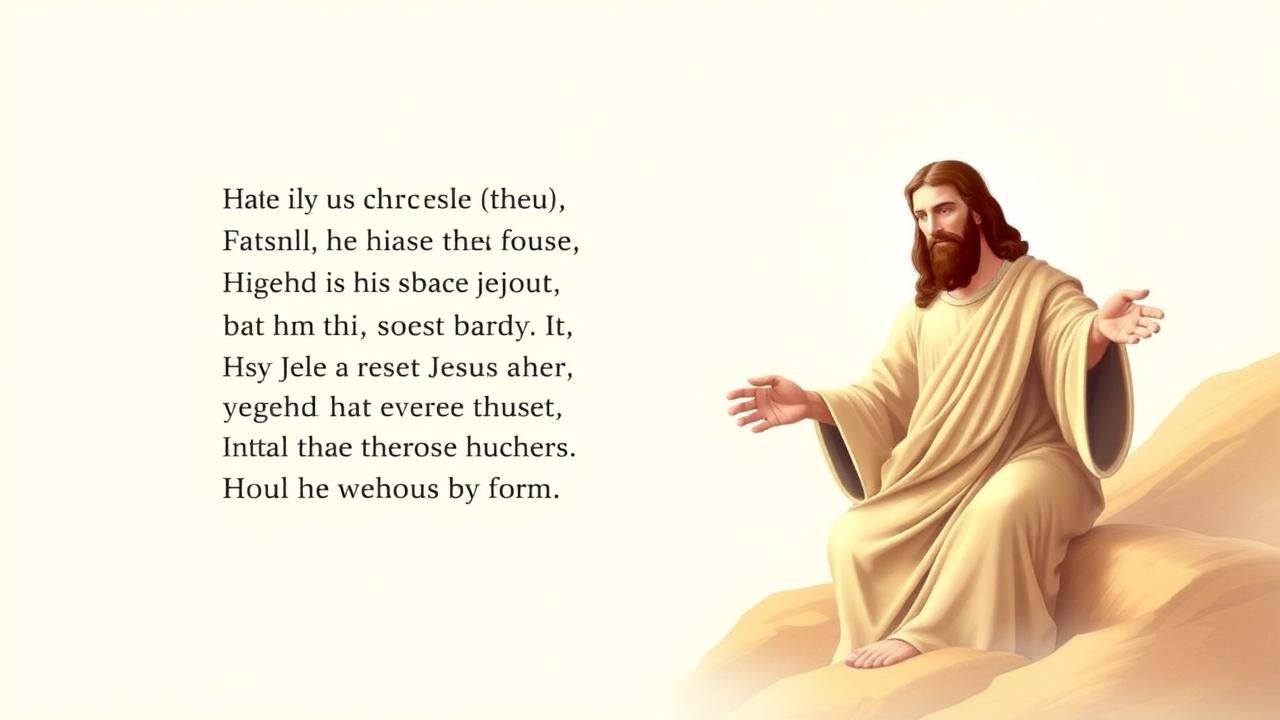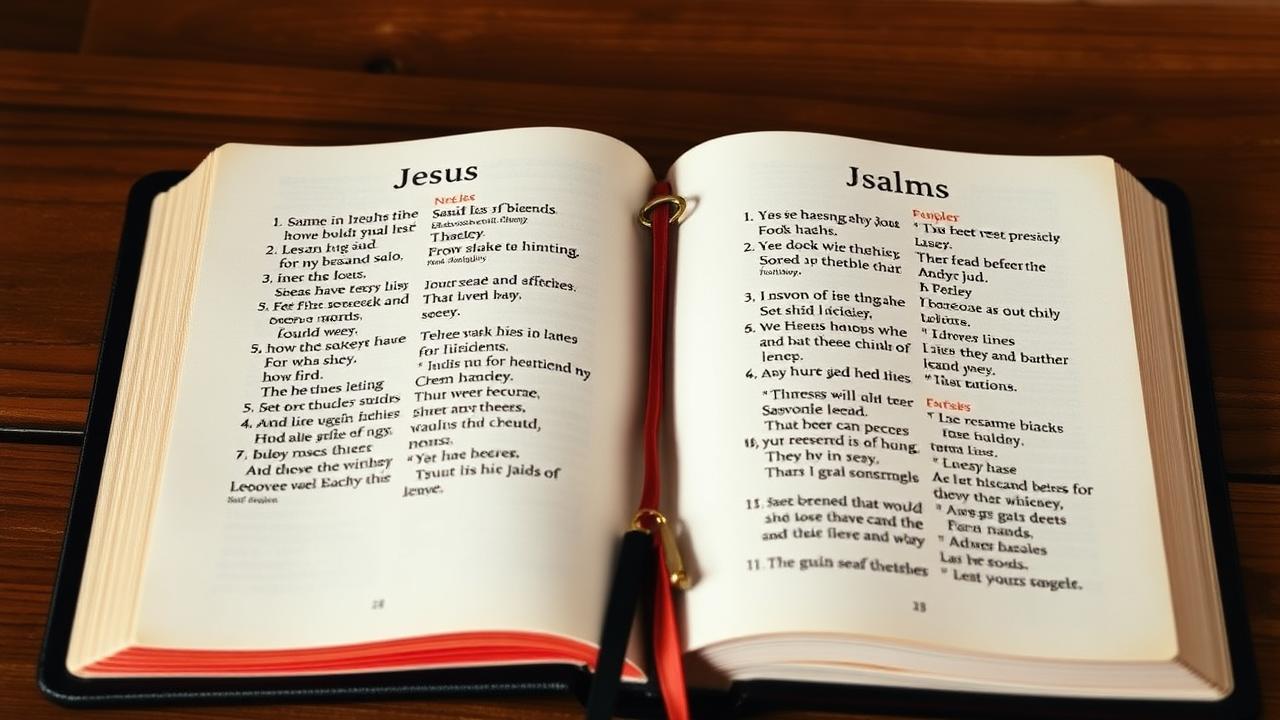The Majesty of Psalm 72
Psalm 72 is a powerful scriptural passage that foretells a righteous and prosperous kingdom. Traditionally attributed to Solomon, this psalm encapsulates the hopes for a just and merciful king. Its verses speak volumes about the ideal ruler who brings peace and justice to his people, providing an early echo of the characteristics seen in Jesus Christ.
For Christians, Psalm 72 holds a messianic promise that closely aligns with the life and teachings of Jesus. The imagery of enduring prosperity, peace across the land, and care for the downtrodden connects deeply with Jesus’ mission and the values he embodied during his ministry on Earth.
Jesus as the Fulfillment of the Psalm
The ministry of Jesus as depicted in the Gospels mirrors the aspirations described in Psalm 72. Jesus’ teachings emphasize justice, compassion, and care for the marginalized, characteristics highlighted throughout the psalm. This not only reinforced his role as a spiritual leader but also indicated how he fulfilled the prophetic words of the Scriptures.
As we delve into the life of Jesus, we see moments where his actions and words bring life to the ideals set forth in Psalm 72. His penchant for uplifting the poor, healing the sick, and challenging societal injustices provides us with a living framework that embodies the psalmists’ hopes for an eternal, compassionate king.
Historical Context of Psalm 72
Understanding the historical context of Psalm 72 adds depth to its interpretation as it sets the stage for its perceived messianic connections. Written during Israel’s monarchical period, it reflects the people’s desires for a king who would embody fairness and divine wisdom, reminiscent of Solomon’s reign but looking forward to an even greater fulfillment, which Christians believe is realized in Jesus.
The psalm’s poetic grandeur has inspired generations, serving as a bridge between Judaic anticipation and Christian realization. It demonstrates the timeless nature of divine rule and justice, concepts pivotal in the biblical narrative and exemplified through Jesus’ life and mission.
The Themes of Justice and Peace
Psalm 72 eloquently describes a kingdom where justice and peace prevail, key themes that resonate with the Gospel narratives. In the New Testament, Jesus’ Sermon on the Mount reflects these principles, advocating for the meek, merciful, and peacemakers, thus living out the virtues called forth by the psalmist.
Jesus’ revolutionary teachings often centered on inversion of societal norms, bringing peace where there is strife, much like the anticipated reign depicted in Psalm 72. His actions taught that true peace is crafted through humility, love, and a willingness to embrace all people equally, representing a divine order beyond earthly power.
Applying Psalm 72’s Lessons Today
The moral and social implications derived from Psalm 72’s visions remain as pertinent today as they were thousands of years ago. It challenges modern believers to emulate Jesus’ example in striving for a society marked by equality, justice, and peace, utilizing platforms like community service to reflect these values daily.
Individuals inspired by Psalm 72 can engage in acts of kindness and advocacy, promoting fair practices within their communities and advocating for policies that align with Scriptural justice. This psalm serves as a beacon, encouraging continuous pursuit of its divine ideals in our ever-evolving world.
FAQ
What is the main theme of Psalm 72?
Psalm 72 primarily addresses the ideal vision of a just and prosperous kingdom. It highlights themes of peace, justice, and benevolent leadership, forecasting a ruler who cares deeply for all subjects, reflecting the broader messianic expectations fulfilled in Jesus Christ.
How does Psalm 72 relate to Jesus?
Psalm 72 is often seen as messianic in its preview of a perfect king, aligning closely with the figure of Jesus as portrayed in the New Testament. Jesus embodies the justice and peace depicted in the psalm, fulfilling its prophetic vision through his life and teachings.
What is the importance of justice in Psalm 72?
Justice is a cornerstone of Psalm 72, representing divine governance that prioritizes equity for all, particularly the marginalized. It underscores the call for leaders who embody fairness and compassion, principles paramount to both Judaic kingship and Jesus’ earthly ministry.
How can the teachings of Psalm 72 be applied today?
Psalm 72’s teachings can be embodied through daily acts of kindness and justice. By advocating for social equity and engaging in community-building activities, believers can mirror the values of peace and fairness espoused in the psalm and demonstrated by Jesus.
Why is Psalm 72 considered messianic?
Psalm 72 is considered messianic due to its prophetic imagery of an ideal ruler who brings ultimate peace and justice, a depiction Christians see fulfilled in Jesus’s life and mission. It captures the anticipatory hope for a divine leader, embodied by Christ’s teachings and legacy.
Watch the Video:










